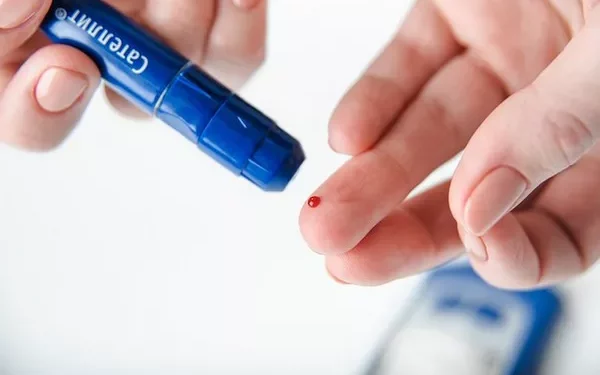Monitoring blood sugar levels is a crucial aspect of managing diabetes. It helps individuals with diabetes to maintain control over their condition, prevent complications, and make informed decisions about their diet, medication, and lifestyle. One of the most common questions among people with diabetes is, When should you test your blood sugar in the morning? This article aims to provide a comprehensive answer to this question by exploring the importance of morning blood sugar testing, the best times to test, and factors that may influence blood sugar levels in the morning.
The Importance of Morning Blood Sugar Testing
Morning blood sugar testing is vital for several reasons. First and foremost, it provides a baseline measurement that reflects how well your body is managing blood sugar levels overnight. This information can be crucial for adjusting medications, meal plans, and physical activity to ensure optimal blood sugar control throughout the day.
Testing your blood sugar in the morning also helps to identify patterns of hyperglycemia (high blood sugar) or hypoglycemia (low blood sugar) that may occur during the night. For example, some people with diabetes experience a phenomenon known as the “dawn phenomenon,” where blood sugar levels rise in the early morning hours due to the release of certain hormones. Others may experience the “Somogyi effect,” where low blood sugar during the night leads to a rebound high blood sugar in the morning. Identifying these patterns can help healthcare providers make appropriate adjustments to treatment plans.
Additionally, morning blood sugar levels can influence the rest of the day’s blood sugar management. If your blood sugar is high or low in the morning, it can set the tone for how well your blood sugar levels are controlled throughout the day. Therefore, understanding when to test your blood sugar in the morning is key to achieving better overall blood sugar management.
Optimal Timing for Morning Blood Sugar Testing
The optimal timing for morning blood sugar testing can vary depending on individual factors, such as the type of diabetes, medication regimen, and specific goals for blood sugar control. However, there are some general guidelines that can help determine the best time to test.
Fasting Blood Sugar Test (Upon Waking Up)
The most common time to test blood sugar in the morning is immediately upon waking up, before eating or drinking anything. This is known as a fasting blood sugar test. Fasting blood sugar levels provide a clear picture of how well your body is managing blood sugar overnight without the influence of food. For most people with diabetes, the target fasting blood sugar level is between 80 and 130 mg/dL (4.4 to 7.2 mmol/L), but this can vary based on individual goals set by a healthcare provider.
Testing your blood sugar as soon as you wake up allows you to take corrective action if needed. For example, if your blood sugar is higher than your target range, you may need to adjust your medication or insulin dosage. On the other hand, if your blood sugar is low, you may need to eat a small snack to raise it to a safer level before starting your day.
Post-Breakfast Blood Sugar Test
In some cases, it may be beneficial to test your blood sugar about 1 to 2 hours after eating breakfast. This is known as a postprandial blood sugar test. Postprandial blood sugar levels provide insight into how your body is processing the carbohydrates from your meal. For most people with diabetes, the target postprandial blood sugar level is less than 180 mg/dL (10.0 mmol/L).
Testing your blood sugar after breakfast can help you understand how your meal affects your blood sugar levels and whether any adjustments are needed in your diet or medication. For example, if your blood sugar is consistently high after breakfast, you may need to reduce your carbohydrate intake or adjust your insulin dosage.
Testing Before Physical Activity
If you plan to engage in physical activity in the morning, it may be helpful to test your blood sugar before starting your workout. Exercise can have a significant impact on blood sugar levels, and knowing your blood sugar level before you begin can help you take the necessary precautions to avoid hypoglycemia or hyperglycemia during or after exercise.
If your blood sugar is below 100 mg/dL (5.6 mmol/L) before exercise, you may need to eat a small snack to prevent hypoglycemia. Conversely, if your blood sugar is above 250 mg/dL (13.9 mmol/L) and you have ketones present, it may be advisable to delay exercise until your blood sugar levels are under better control.
Factors That Influence Morning Blood Sugar Levels
Several factors can influence blood sugar levels in the morning, making it essential to consider these factors when deciding when to test.
The Dawn Phenomenon
The dawn phenomenon is a natural rise in blood sugar levels that occurs in the early morning hours, typically between 2:00 AM and 8:00 AM. This increase in blood sugar is caused by the release of hormones such as cortisol, glucagon, and growth hormone, which trigger the liver to release glucose into the bloodstream. The dawn phenomenon can lead to higher-than-expected blood sugar levels in the morning, even in people who haven’t eaten anything since the previous night.
If you consistently notice high blood sugar levels in the morning, the dawn phenomenon may be the cause. In such cases, your healthcare provider may recommend adjusting your medication or insulin regimen to counteract this effect.
The Somogyi Effect
The Somogyi effect, also known as rebound hyperglycemia, occurs when blood sugar levels drop too low during the night, prompting the body to release stress hormones that raise blood sugar levels in response. This can result in high blood sugar levels in the morning, despite low blood sugar levels during the night.
To determine if the Somogyi effect is responsible for high morning blood sugar levels, your healthcare provider may suggest testing your blood sugar in the middle of the night (around 2:00 AM to 3:00 AM). If your blood sugar is low at that time and high in the morning, it may indicate the presence of the Somogyi effect. Adjusting your bedtime snack, insulin dosage, or medication can help prevent this rebound hyperglycemia.
Medication Timing
The timing of your diabetes medications, particularly insulin, can significantly impact your morning blood sugar levels. For example, if you take long-acting insulin at night, its effectiveness may wear off by the morning, leading to higher blood sugar levels upon waking. On the other hand, if you take certain oral diabetes medications at night, they may continue to lower your blood sugar levels through the early morning hours.
It’s essential to work with your healthcare provider to determine the best timing for your medications to achieve optimal blood sugar control in the morning.
Diet and Evening Meals
The type of food you eat and the timing of your evening meal can also influence your morning blood sugar levels. Meals that are high in carbohydrates or contain a lot of sugar can cause blood sugar levels to rise and remain elevated through the night. Additionally, eating late at night may contribute to higher blood sugar levels in the morning.
To help maintain stable blood sugar levels overnight, consider eating a balanced meal that includes protein, healthy fats, and fiber, and avoid consuming large amounts of carbohydrates close to bedtime. If you’re prone to low blood sugar levels during the night, a small bedtime snack that includes protein and a small amount of carbohydrates may help prevent hypoglycemia.
Stress and Sleep Patterns
Stress and poor sleep can both contribute to higher blood sugar levels in the morning. Stress triggers the release of hormones such as cortisol, which can raise blood sugar levels. Additionally, lack of sleep or poor-quality sleep can disrupt the body’s ability to regulate blood sugar levels effectively.
If you notice that your blood sugar levels are higher than usual in the morning, consider whether stress or sleep issues may be contributing factors. Practicing stress management techniques, such as deep breathing, meditation, or gentle exercise, and prioritizing good sleep hygiene can help improve blood sugar control.
Individualized Blood Sugar Testing Plans
While the general guidelines provided above can help determine the best time to test your blood sugar in the morning, it’s important to remember that blood sugar management is highly individualized. Factors such as age, type of diabetes, overall health, lifestyle, and specific treatment goals all play a role in determining the optimal blood sugar testing plan.
Working closely with your healthcare provider is essential to developing a personalized blood sugar testing schedule that meets your needs. Your provider can help you understand how different factors, such as medication, diet, and exercise, affect your blood sugar levels and provide guidance on when and how often to test.
See also: What is the Correct Normal Value of Blood Glucose?
Conclusion
Testing your blood sugar in the morning is a critical component of diabetes management. It provides valuable information about how well your body is managing blood sugar levels overnight and sets the stage for better blood sugar control throughout the day. The most common times to test blood sugar in the morning are immediately upon waking up (fasting blood sugar), after breakfast (postprandial blood sugar), and before physical activity. However, the optimal timing for morning blood sugar testing can vary depending on individual factors, such as the type of diabetes, medication regimen, and specific goals for blood sugar control.
Several factors, including the dawn phenomenon, the Somogyi effect, medication timing, diet, and stress, can influence morning blood sugar levels. Understanding these factors and working with your healthcare provider to develop a personalized blood sugar testing plan can help you achieve better overall blood sugar management and reduce the risk of complications associated with diabetes.
In summary, the key to effective morning blood sugar testing is consistency, awareness of individual factors that may affect blood sugar levels, and close collaboration with your healthcare provider. By testing your blood sugar at the right times and making necessary adjustments to your treatment plan, you can take control of your diabetes and improve your overall health and well-being.
Related topics:
What Is Normal Blood Sugar in mmol/L?


























